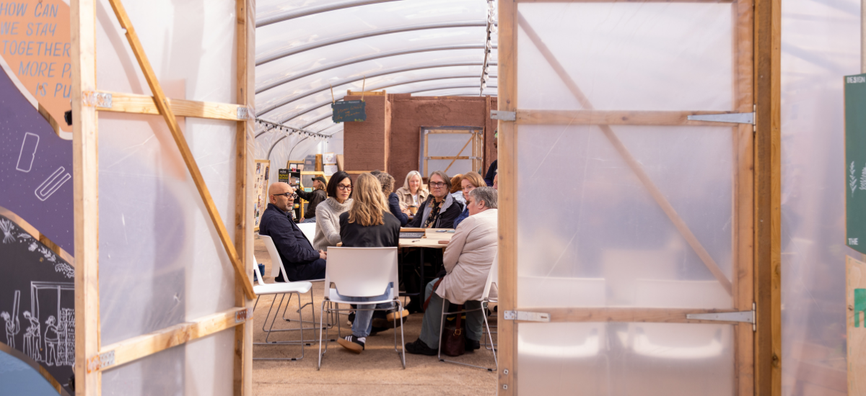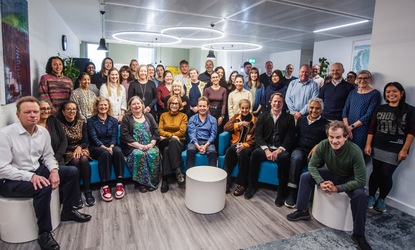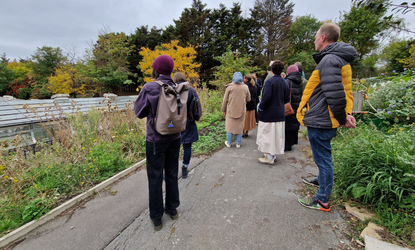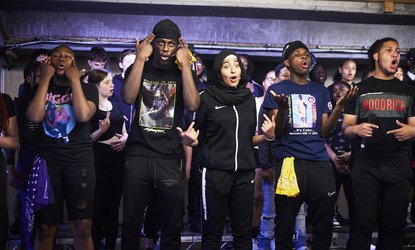We have offered over £2m in additional, unrestricted grants to the organisations led by and for racialised communities that are in our portfolio. The funding will be shared equally between all organisations that meet the criteria.
(This is an old news article, published on 26 March 2021)
At the end of 2020, we shared our action plan for Diversity, Equity and Inclusion (DEI). As part of this, we want to address the discrimination racialised communities* have experienced due to funder practice and processes, including our own.
We have committed to a range of actions to ensure that we give more funding to organisations run by and for racialised communities in future, including:
- Funding more organisations led by and for people from racialised communities
- Giving more long-term funding and support to organisations already in our portfolio that are working to advance racial justice;
- Working with partners to identify, fund, and support smaller organisations led by racialised people that are working towards our impact goals; and
- Using our power as a funder to influence recruitment and governance practice to be more inclusive in sectors (e.g. environment) where the majority of organisations are not ethnically diverse.
Giving £2m to organisations within our portfolio working on racial justice, which are led by and for the people experiencing racial injustice, is our first step.
What are we doing?
We offered further unrestricted grants to 40 organisations led by and for people from racialised communities in our portfolio. We know that the COVID-19 crisis continues to have a disproportionate impact on racialised communities and need more support. These are brilliant organisations in a range of sectors including the Arts, Children and Young People, Equality and Immigration doing vital work to support their communities and to advance racial justice.
The grants are unrestricted for registered charities and core funding for others. Whilst there will be no additional reporting for these grants, we do want to learn about the impact of this funding through our existing relationship. These grants will not affect any current or future funding that they receive or have plans to apply for.
Our process
- 16 February
We got in touch with all the organisations in our portfolio that we believed meet the following criteria**:
- the senior management team and trustee board is composed of more than 50% people from racialised communities; and
- the organisation’s focus and remit are primarily and intentionally on people from racialised communities.
There was no application process but the organisations were asked to confirm they met the above criteria.
- 18 February
We shared what we were doing on our website (this is an updated version of that page) so any organisations in our portfolio who met the above criteria but hadn't heard from us could get in touch by 4 March. This was also shared on our social media and in our newsletter.
- 25 March
Each of the 40 organisations who responded confirming they met the criteria was awarded a £54,000 grant.
We chose to split the £2m funding equally amongst the organisations because we did not want to base allocations on prior decisions on requests for funding. This was initially split amongst 37 organisations who responded by 4 March. Three additional grants for the same amount (£54,000) were awarded afterwards to organisations who responded after 4 March. All our grants will be published to 360Giving.
Initially, £1.5m was agreed for this fund. This was increased to over £2m after we got in touch with organisations about the fund.
* We are using ‘racialised communities’ to acknowledge that Black and Asian people, and people from other minority ethnic communities (often termed “BAME”) are categorised by race like this, only because of the white-led systems within which they exist. “Racialised” doesn’t define people’s community or identity, but the phenomenon that is happening to them. We realise the term has its own challenges and we are working with partners including 360 Giving on a shared taxonomy for funders, which will help to inform our language in future. [2023 update - our terminology has changed and our current approach to language and data is here]
**Our criteria for this is based on the Funders Alliance for Race Equality definition for ‘BAME-led organisation’.
Why are we doing this now?
We want to acknowledge the disproportionate impact the ongoing COVID-19 crisis continues to have on racialised communities by offering extra support to organisations in our portfolio that are led by and for those communities.
As part of our approach to Diversity, Equity and Inclusion, we made four commitments on our funding. This funding is in line with our commitment to giving more long-term funding and support to organisations already in our portfolio that are working to advance racial justice.
There is still a lot more for us to learn and do. By offering this additional support to organisations we already have a relationship with, we hope to not just enhance their capacity but also provide them with an opportunity to use the funding in the best way they see fit.
What about organisations that aren’t already in your portfolio?
We have started work on our other three funding commitments, and will share more about our progress soon:
- Funding more organisations led by and for people from racialised communities;
- Working with partners to identify, fund, and support smaller organisations led by racialised people that are working towards our impact goals; and
- Using our power as a funder to influence recruitment and governance practice to be more inclusive in sectors (e.g. environment) where the majority of organisations are not ethnically diverse.
In response to COVID-19, we have given £1.5m in grants to Imkaan and Rosa's Emergency Response Fund for BME Women’s Organisations , Refugee Action's Respond and Adapt programme and Comic Relief's Global Majority Fund to reach smaller, grassroots organisations through specialist funds. We are also working on expanding our networks within racialised communities and building relationships with more diverse organisations – particularly those led by the communities they serve. And we’re conducting an in-depth review of our data, funding guidance, and decision-making process.
In addition to proactively inviting more organisations that are led by and for racialised communities that share our goals to apply for funding, we will use what we learn to inform our longer-term strategy as well as improvements we can make to our open application process.
As ever, we very much welcome feedback and questions – do get in touch by emailing communications@esmeefairbairn.org.uk.
Please note this page was originally published on 18 February 2021 and updated on 26 March 2021.



